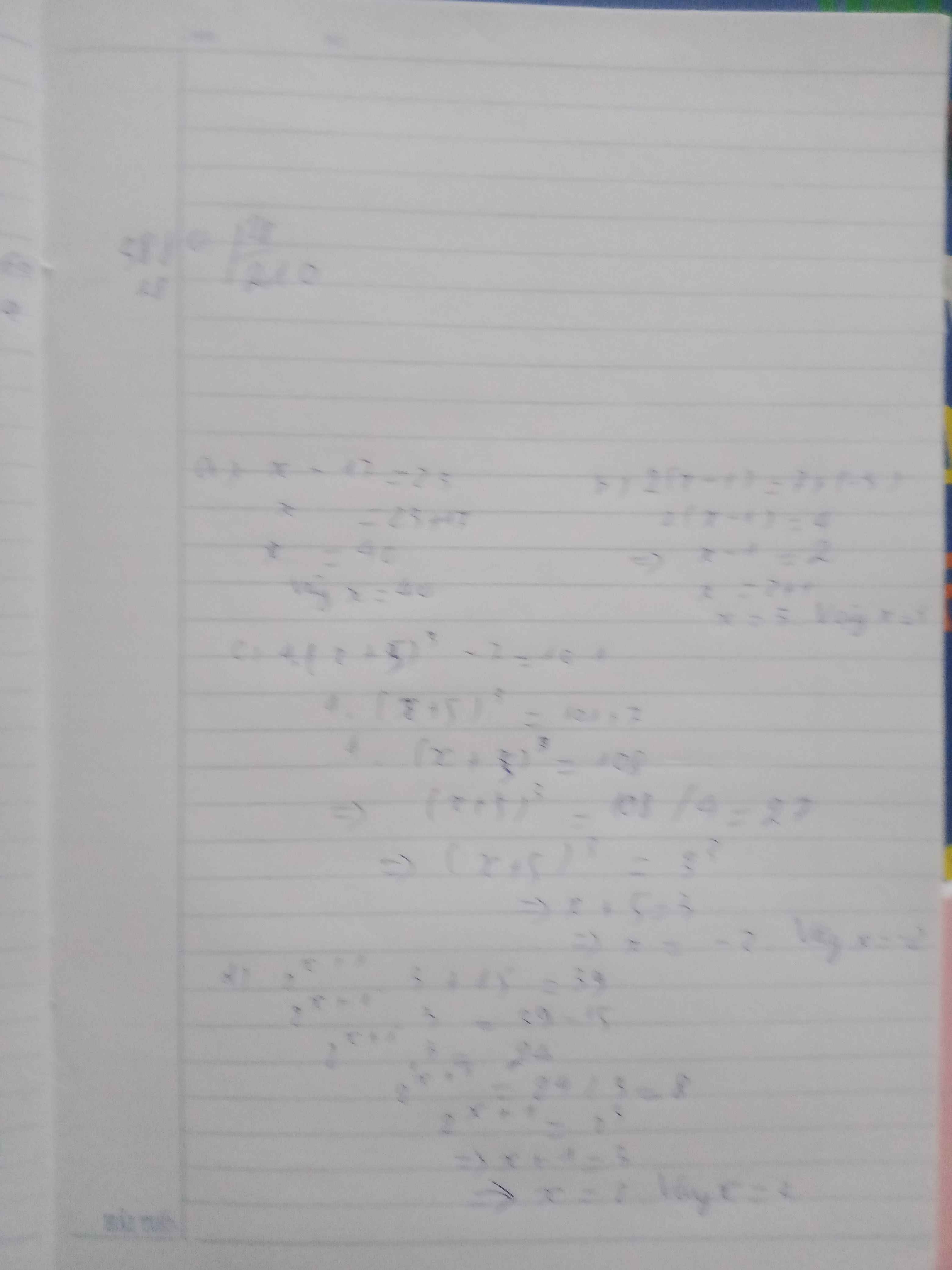
Hãy nhập câu hỏi của bạn vào đây, nếu là tài khoản VIP, bạn sẽ được ưu tiên trả lời.


c: Ta có: 11+x:5=13
\(\Leftrightarrow x:5=2\)
hay x=10
d: Ta có: \(13+2\left(x+1\right)=15\)
\(\Leftrightarrow2x+2=2\)
\(\Leftrightarrow2x=0\)
hay x=0
e: Ta có: 2x+21=41
\(\Leftrightarrow2x=20\)
hay x=10
f: Ta có: \(12+3\left(x-2\right)=60\)
\(\Leftrightarrow3\left(x-2\right)=48\)
\(\Leftrightarrow x-2=16\)
hay x=18
g: Ta có: \(24x-11\cdot13=11\cdot11\)
\(\Leftrightarrow24x=11\cdot24\)
hay x=11
h: Ta có: \(17-\left(x-4\right):2=3\)
\(\Leftrightarrow\left(x-4\right):2=14\)
\(\Leftrightarrow x-4=28\)
hay x=32

`a)|2x-15|=13`
`**2x-15=13`
`<=>2x=28`
`<=>x=14.`
`**2x-15=-13`
`<=>2x=-2`
`<=>x=-1.`
`b)|7x+3|=66`
`**7x+3=66`
`<=>7x=63`
`<=>x9`
`**7x+3=-66`
`<=>7x=-69`
`<=>x=-69/7`
`c)|5x-2|=0`
`<=>5x-2=0`
`<=>5x=2`
`<=>x=2/5`
\(a,\Leftrightarrow\left[{}\begin{matrix}2x-5=13\\2x-5=-13\end{matrix}\right.\)
\(\Leftrightarrow\left[{}\begin{matrix}x=9\\x=-4\end{matrix}\right.\)
Vậy ...
\(b,\Leftrightarrow\left[{}\begin{matrix}7x+3=66\\7x+3=-66\end{matrix}\right.\)
\(\Leftrightarrow\left[{}\begin{matrix}x=9\\x=-\dfrac{69}{7}\end{matrix}\right.\)
Vậy ...
\(c,\Leftrightarrow5x-2=0\)
\(\Leftrightarrow x=\dfrac{5}{2}\)
Vậy ...

a, \(\left(\dfrac{1}{2}+\dfrac{4}{7}\right):x=\dfrac{-3}{4}\)
\(\dfrac{15}{14}:x=\dfrac{-3}{4}\)
=> x= \(\dfrac{-7}{10}\)
b, 0,5:x-\(1\dfrac{3}{4}\)= 25%
0,5:x-\(\dfrac{7}{4}=\dfrac{1}{4}\)
0,5:x = 2
=> x = \(\dfrac{1}{4}\)

a, \(\left(\dfrac{7}{2}-2x\right).\dfrac{10}{3}=\dfrac{22}{3}\Leftrightarrow\dfrac{7}{2}-2x=\dfrac{22}{10}=\dfrac{11}{5}\)
\(\Leftrightarrow2x=\dfrac{13}{10}\Leftrightarrow x=\dfrac{13}{20}\)
b, \(\dfrac{4x}{9}=\dfrac{9}{8}-\dfrac{125}{1000}=1\Leftrightarrow x=\dfrac{9}{4}\)
c, \(-\dfrac{x}{21}=\dfrac{60}{21}\Rightarrow x=-60\)

Lời giải:
a)
$\frac{4}{7}x=\frac{2}{3}+\frac{1}{5}=\frac{13}{15}$
$x=\frac{13}{15}:\frac{4}{7}=\frac{91}{60}$
b)
$\frac{5}{7}:x=\frac{1}{6}-\frac{4}{5}$
$\frac{5}{7}:x=\frac{-19}{30}$
$x=\frac{5}{7}:\frac{-19}{30}=\frac{-150}{133}$
a) \(\dfrac{4}{7}.x-\dfrac{2}{3}=\dfrac{1}{5}\)
\(\dfrac{4}{7}.x=\dfrac{1}{5}+\dfrac{2}{3}\)
\(\dfrac{4}{7}.x=\dfrac{13}{15}\)
\(x=\dfrac{13}{15}:\dfrac{4}{7}\)
\(x=\dfrac{91}{60}\)
b) \(\dfrac{4}{5}+\dfrac{5}{7}:x=\dfrac{1}{6}\)
\(\dfrac{5}{7}:x=\dfrac{1}{6}-\dfrac{4}{5}\)
\(\dfrac{5}{7}:x=\dfrac{-19}{30}\)
\(x=\dfrac{5}{7}:\dfrac{-19}{30}\)
\(x=\dfrac{-150}{133}\)

a, x=\(\frac{21}{52}\)
b,x=\(\frac{11}{21}\)
a) Quy đồng mẫu. Rồi tính ra x
b) Tự quy đồng vế phải thì sẽ có:
\(\frac{x}{3}=\frac{11}{21}\)
Ta có: \(21x=3.11\Rightarrow21x=33\Rightarrow x=33:21=\frac{11}{7}\)
(Lớp 6 cho ra vậy liệu có..?)